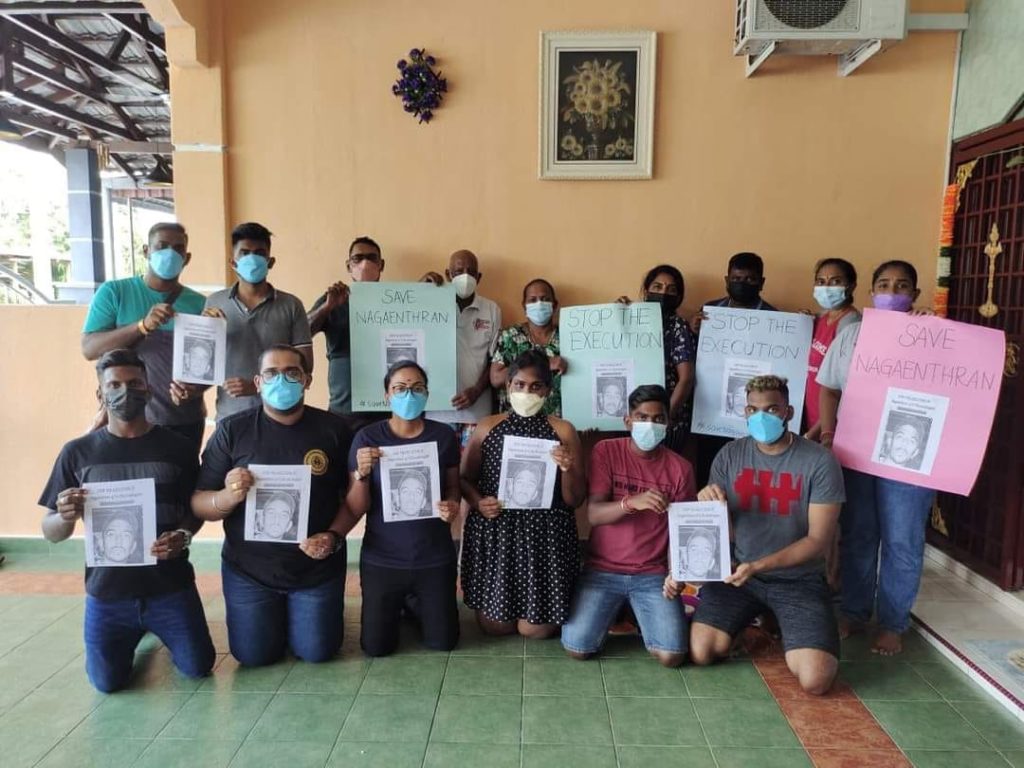
By Manik Mehta
Speaking “strictly off the record”, one UN official told the Weekly Echo that there was widespread concern among human rights experts that the execution of the two Malaysians was “perilously close”.

The two Malaysian nationals Nagaenthran Dharmalingam and Datchinamurthy Katalah were handed down the death sentences for drug offences. The OHCHR issued a statement reminding of the “imminent” execution. There had been an apparently “alarming acceleration in execution notices” in Singapore since the start of the year.
According to the OHCHR spokeswoman Ravina Shamdasani, Dharmalingam had been arrested since 2009 and convicted of drug trafficking. The prisoner’s family was informed only last week that his execution was to take place on Wednesday.
Many representations have been made by various organizations, including from the United States and elsewhere, calling on the Singapore Government to halt the executions because he suffered from an intellectual disability. These pleas for clemency,, according to New York based experts, had fallen on deaf ears in Singapore.
Kataiah, the second prisoner awaiting execution, was arrested in 2011 and convicted on charges of trafficking the substance diamorphine into Singapore; his family was notified about a week ago that his execution would take place on Friday.
Many experts see Singapore’s record of executions as among the worst in the world, only superseded by China, North Korea, Iran and some Middle Eastern countries. According to diplomatic sources and human rights organizations, After some two years, Singapore carried out the execution on March 30 of Abdul Kahar bin Othman who had also been convicted of drug-related offence.
The OHCHR revealed that at least three other men, convicted of drug-related offences, risk the death sentence; the three men have been identified as Roslan bin Bakar, Roman bin Abdullah and Pannir Selvam Pranthaman.
Besides the three, Singapore has more than 50 persons reportedly on death row.
Imposing the death sentence is a sensitive issue in many countries, including the United States which, however, has not abolished capital punishment though it is handed down to violent criminals who perpetrate killings of their victims.
According to the UN Human Rights Committee, there are some 170 states have abolished or imposed a moratorium on execution of convicted prisoners.
A UN appointed independent panel stated that a small number of countries had retained executions, largely, because of the notion that the death sentence was a deterrence against violent criminal acts; but a few countries – an oblique reference to Singapore – carried out the executions not only for severe crimes involving killings but also drug-related or terrorism charges. Human rights organizations note that more work needs to be done towards the goal of achieving universal abolition of the death sentence in the interest of human dignity and progressive development of human rights.
Human rights experts point out that such a goal would conform to the United Nations General Assembly resolutions, like-minded UN member states, civil society, UN Special Procedures mandates, etc., calling for a moratorium on the death penalty and eventually leading to its abolition worldwide.
The imposition of death sentences on people convicted of drug offences is seen by many Western countries as “inhuman” and “uncivilized”. Indeed, Shamdasani emphasized that sentencing people to death for drug-related offences was “incompatible with international human rights law”.
She called on Singapore to stop the execution plans immediately. “We urge the Singaporean authorities to immediately halt its execution plans, to consider granting Dharmalingham and Kataiah clemency, and to commute their sentences to prison terms,” she said.
OHCHR also urged the Singaporean Government to review its long-standing position on the death penalty, citing “increasing evidence showing its ineffectiveness as a deterrent”, and to consider implementing a moratorium on all death sentences, pending such a review.
UN experts have been quietly campaigning with Singapore to stay the execution orders against the two Malaysians since months. In November 2021, a group of UN human rights experts had called on Singapore not to carry out the death sentences against the Malaysians who had spent more than a decade on death row.
Dharmalingam, apprehended in 2009 after he crossed the border carrying nearly 43 grams of diamorphine, a narcotic analgesic used to treat severe pain, received the death sentence in 2010.
His lawyers argued that Dharmalingam should not have received the death penalty in the first place because he was incapable of understanding his actions. During the trial it was revealed he has an IQ of 69, which is recognized as representing an intellectual disability. Lawyers maintain that Dharmalingam’s mental health had further deteriorated since he was on death row for the past 11 years.
Five UN experts, appointed by the UN Human Rights Council in Geneva, have stated in the past that Singapore had amended its drugs legislation in 2012, which allowed drug couriers to be sentenced to life behind bars if they assist the Public Prosecutor, or in cases of “abnormality of the mind”. The death penalty remains mandatory in other cases